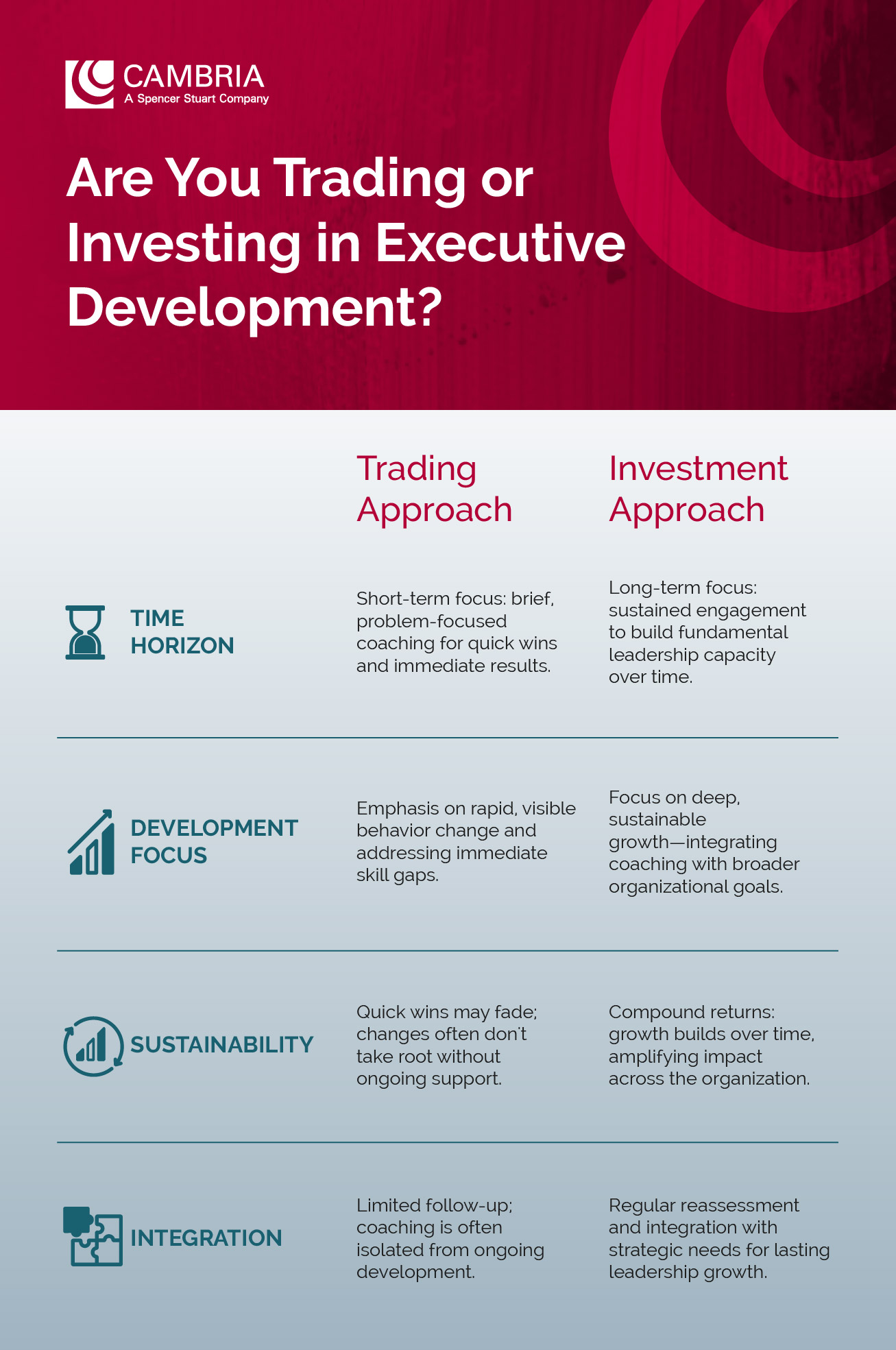

The economy is a front-and-center topic these days, often referencing the stock market as a de facto gauge to indicate its overall health in response to current policies, practices, and foundational elements. We can also use the stock market as an analogy for considerations around executive development, particularly executive coaching. Specifically, there are those who “trade” in the market and there are those who “invest” in the market. We see the same thing in how organizations approach executive development.
The Trading Approach to Executive Coaching
Traders in the market tend to take a very short-term focus, seeking to collect as many “wins” as they can while mitigating the “losses” as much as possible to ensure a net positive return on a relatively consistent basis. Many organizations approach executive coaching like traders approach the market—seeking quick returns and immediate behavioral adjustments. This “trading” mindset typically manifests as:
- Brief, problem-focused engagements
- Emphasis on rapid, visible behavior modification
- Focus on addressing immediate challenges or skill gaps
- Limited follow-up or integration into ongoing development
Like trading in the market, this approach can yield quick wins. An executive might learn how to navigate difficult conversations more effectively or how to refine strategies related to board dynamics, or even how to improve general self-management on a day-to-day basis. These are all valuable outcomes and there may be times when this is exactly what the organization needs. However, just as trading profits can be fleeting, these behavioral changes often fail to take root in a sustainable way. Similar to how an organization may deploy a stock buyback strategy to help move its share prices upward, the results can be powerful in the moment but will be short-lived without addressing the fundamentals of the organization with a longer-term lens in mind.
The Investment Approach to Executive Coaching
Investors in the market tend to take a longer-term view of the market. Decisions are made not just on present factors and conditions but on more of the financial fundamentals of the organizations, future prospects and potential, and a more future-oriented focus on market drivers, just to name a few of the factors. Likewise, in what we could call the “investment” approach to executive coaching, the perspective is a longer-term focus—one that parallels long-term, value investing. In this longer-term focus for executive development, we are likely to see:
- Sustained engagement with appropriate time horizons
- Focus on fundamental leadership capacity, not just visible behaviors
- Integration with broader development goals and organizational context
- Regular reassessment and course correction
When executives and organizations truly invest in coaching, they allow time for deeper patterns to emerge and be supported. They create space for experimentation, reflection, and integration of new approaches. Most importantly, they recognize that, just as an investment portfolio experiences both gains and losses, meaningful development doesn’t follow a linear path, either.
The Compound Returns of Long-Term Development

The real power of the investment approach to executive coaching becomes evident when we consider the concept of compound returns. In financial investment, the magic happens not in the first months but in the later years as returns build upon returns.
Similarly, in executive development, the most significant growth often occurs after the initial coaching engagement, as executives:
- Apply new insights across increasingly diverse and complex situations
- Develop their own feedback mechanisms and reflective practices
- Begin coaching others, amplifying the impact throughout the organization
- Integrate their personal development with strategic organizational needs
Finding the Right Balance
Organizations need both approaches at different times. Quick interventions have their place in addressing urgent leadership challenges. However, as you consider your executive development strategy, ask yourself: Are we trading or investing in our executives?
In an economic climate that demands both immediate performance and long-term resilience, the organizations that thrive will be those that strike the right balance; addressing today’s leadership challenges while investing in the leadership capacity needed for tomorrow’s opportunities.
The question isn’t whether you can afford to invest in sustained executive coaching, but whether you can afford not to.





